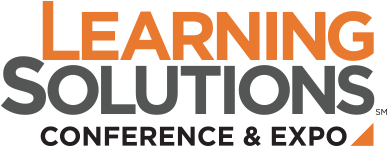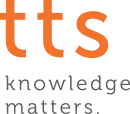Mark your calendars now for Learning Solutions 2018. Join us March 27 – 29, 2018 at The Rosen Centre in Orlando, FL! Learn more.
Learning Solutions Sessions
Learning Solutions 2017 Conference & Expo offers over 160 sessions covering eLearning best practices, how-tos, case studies, and emerging trends. These sessions will help you develop new skills and knowledge, which will help you build more engaging and effective learning experiences.
Find sessions on topics like these:
Specialized Focuses
In addition to the great tracks at Learning Solutions 2017, there are a number of specialized sessions curated to help you put your skills into practice immediately.

AlignED sessions focus on what higher ed and corporate learning professionals can learn from one another. These sessions are equally applicable to both academic and business environments.

Making Measurement Work sessions focus on the practical applications of data and analytics. They also show how organizations are being strategic in their approaches to measuring learning.

BYOL (Bring Your Own Laptop®) sessions and workshops ensure that you receive in-depth, hands-on training and enable you to follow along with the instructor step-by-step.
 To give a brief overview of their sessions, many speakers have provided sessions trailers which are located on the description pages of those sessions. To view a complete list of these trailers, please visit our YouTube playlist page.
To give a brief overview of their sessions, many speakers have provided sessions trailers which are located on the description pages of those sessions. To view a complete list of these trailers, please visit our YouTube playlist page.
Filter By:
Sessions in Instructional Design Track
Whether you’re looking to showcase your work internally, seeking employment, or prospecting for clients, developing and maintaining an up-to-date portfolio will help you articulate what you do well. With a little forethought and planning, your portfolio can become one of your most valuable tools, opening up conversations and possibilities beyond your expectations.
Read MoreTraditional eLearning can be dull and demotivating, a reality that runs counter to human nature. People eagerly consume and comprehend new ideas whenever they find the content engaging. They want eLearning that leverages learners’ innate desire for autonomy, mastery, and purpose.
Read MoreSTR102 Creating Empowering Sales Training: Simple Solutions That Won’t Break the Bank
Strategic Solutions Stage
Sales training can often seem like the toughest nut to crack. You plan, design, learn new tools, hire consultants, and still you haven’t moved the needle. The sales team is the lifeblood of the company, generating revenue every day. The demand is high and the pressure strong. Those who are charged with training them face an equal challenge: improve productivity, accelerate deals, and enable individual and team success. How can you accomplish it, especially if you are a team of one?
Read MoreEME103 Prototyping and Designing Experiences: Turning Ideas into Reality
Emerging Tech Stage
Whether you are creating a new project, developing an app, or launching a new platform, come learn about the latest strategies in brainstorming, prototyping, and designing your experiences. This session will highlight tools, techniques, and workflows to help you kick off any project the right way. Learn how to communicate a concept, beginning with low-fidelity prototypes; gather user feedback; and translate into high-fidelity prototypes before you start development. Get pumped and ready to get ideas out of your head and make them reality!
Read MoreThe term “bench strength” is frequently used in relation to leadership, so it isn’t surprising that many organizations are keen to create development programs for their future leaders. However, many of these programs fail to adequately prepare employees for the demands of assuming a leadership role.
Read MoreVery often, training is created in isolation. Stakeholders may believe that “one and done” constitutes a solution; however, in reality, training needs to be reinforced and scaffolded. The eLearning you create is one piece of the puzzle, but it needs a bit more to really stick.
Read MoreToo many eLearning courses are just data dumps full of facts, details, and nonessential content. These kinds of courses also often lack the necessary context to explain how all this information applies to the real world, making them both boring and ineffective. eLearning should be redesigned to better reach the audience and share content with them in a way that’s engaging and practical. And one simple but effective way to do that is through interactive stories.
Read MoreDuring design and development, SMEs and stakeholders sometimes suggest ideas or practices that are antithetical to good instructional design. For example, a designer might have a stakeholder who believes it’s best to simply film a daylong stand-up training session and deliver it as one video. In this case, like so many others, it’s helpful for the designer to identify research findings to help them understand why learning should be designed differently.
Read MoreScience fiction has always challenged people to see their world in new ways, from a glimpse at an imagined “long, long time ago in a galaxy far, far away” in Star Wars to envisioning a potential future centuries from now in Star Trek. Movies like The Matrix, Inception, Minority Report, Blade Runner, and so many others have proposed mind-blowing ideas like alternate realities, parallel universes, transporter beams, and time travel. One of the many reasons this genre is so popular is that it poses a wide range of “what-if” questions and allows its audience to play with possible answers. But these ideas can do more then just entertain you—they can also inspire your work in L&D.
Read MoreMost learning programs have the goal of supporting behavior change, even a change as simple as getting people to do their jobs better. Organizational learning traditionally measures desired outcomes in terms of “learning objectives,” which are fairly straightforward to identify. In contrast, identifying the root cause of behavior change problems is considerably more complex.
Read MoreeLearning professionals are expected to take on a wide variety of very different roles. Sometimes you’re the eLearning developer, graphics designer, narrator, or videographer. Other times you may act as the project manager, researcher, or even the department’s tech guru. It’s no surprise that this can be a daunting and sometimes scary prospect for those new to the industry, leaving them feeling insecure, overwhelmed, and unsure of where to begin.
Read MoreIn the customer training world, L&D professionals often have difficulty convincing their customers to complete coursework. This audience consists of busy professionals who increasingly want training they can take at their own pace, on their own time. While in theory this approach has benefits for both companies and customers, in practice there can be real challenges in trying to convince customers to prioritize this non-mandatory training over their other pressing work tasks and deadlines.
Read MoreWith so much of your design work focused on smooth navigation, creating engaging content, and crafting complex interactions, you may overlook a basic issue: Can people actually be successful with the course? Design flaws such as overload, ineffective use of multimedia (especially narration), and poor assessment items are just some of the ways an “engaging” course can still cause people to stumble.
Read MoreSTR106 Cohort, Support, Report: A Blended Learning Approach to Sales
Strategic Solutions Stage
When your organization is located all across North America, it’s no surprise that it can be a challenge to deliver in-person sales training events. Sylvan Learning needed to find a different approach, and the best option was a blended one. But while blended learning made strategic sense, the team still needed to find a way to use this approach to engage learners while still providing the same level of interactivity as an instructor-led event.
Read MoreEME107 The Path from Instructional Design to Learning Experience Design
Emerging Tech Stage
Instructional design focuses on only a small portion of the learning process—instruction. Much learning also happens through experience, supported by social feedback, content, and some formal instruction (70:20:10 sums it up). This broader approach that looks at the entire learning process goes by a different name: learning experience design (LXD). And while instructional design isn’t dead as a concept, it is finding itself being subsumed by LXD, allowing for a deeper perspective on how designers can provide the experiences that people need to develop job skills.
Read MoreBy creating a learner profile, you will be better able to avoid building training that is ineffective, undesirable, and lacking relevance for your learners. By doing research up front about all aspects of your learners, you will be able to leverage those details to create impactful training that will capture their attention.
Read MoreLS409 Now You Try It! Designing Performance-Based Software Simulations That Stick
Concurrent Session
Organizations implement new software all the time, especially with the constantly changing technology landscape. A healthcare organization was tasked with training thousands of non-clinical associates, nurses, and physicians when it implemented a new electronic health record. The burning question was: How do you teach people new software in a way that sticks? How do you provide learners with authentic context to practice what they’ll actually do on the job?
Read MoreHave you always wanted to play Family Feud but are a bit camera shy? Now is your opportunity! Join this session during the expo reception, where we’ll be looking for audience participation to field two “family” teams. Topics may include best practices, emerging trends and technologies, and common pain points. A game of Family Feud wouldn’t be complete without each member of the winning “family” going home with a prize! Each member of the winning team will walk away with a Bose Wireless Speaker. Let’s play the Feud!
Read MoreeLearning and instructional professionals constantly crave new approaches to design, and they regularly grapple with how best to incorporate design thinking into their workflows. Many experienced designers find themselves struggling to enhance usability, influence perception, and make better design decisions. For the instructional designer, the ability to add techniques that “teach through design” can validate creative prowess and yield enhanced interactive and visual solutions in learning materials.
Read MoreSTR202 Reimagining the New-Hire Experience for the Modern Learner
Strategic Solutions Stage
How do you take a traditional learning experience like new hire training and radically reimagine it for today’s learner? More importantly, why should you want to change your approach? There’s a growing consensus in the L&D industry that new employees learn more on the job than they do through formal learning events. Nonetheless, L&D is in a unique position to shape the experience of new employees from day one, which presents a prime opportunity to create a lasting impact as they begin their new roles.
Read MoreSTR203 Delivering Effective Interactive Health and Safety Training to the Front Lines
Strategic Solutions Stage
This session is a regulatory training case study focusing on a competency course that works on any device, tablet, or PC and provides xAPI analytics and competency data. This approach allows for third-party hosted training to be distributed through content providers by integrating to LMSs using SCORM, AICC, or APIs provided by the LMS or other systems. Along with diagrams of the same approach with multiple Riptide Elements clients, the session will focus on the case study as an innovative solution for food safety team members who manufacture and supply FDA-regulated products around the world.
Read MoreEME204 Sales Event Planning and Execution: Choose Your Own Adventure in Training
Emerging Tech Stage
The ability to plan and execute successful events, promotions, and incentives is a key skill for any sales professional. But, what if your salespeople are dispersed? How can they get the support they need when they need it? How do they know if they’re making the right decisions? And, most importantly, how can an organization ensure that these sales events are worth the investment in the first place?
Read MoreWith tight timelines and rapid development tools, people on your team often find themselves on the hamster wheel of endless production. Out of context, this production machine seems very much alive and in sync with corporate needs. But is it? A six-word story experiment asked people to share their experience with corporate training—and not a single one of these stories offered a happy ending. Even with only six words, stories can weave an intricate web of emotions and events. What if you could capitalize on the power of story to redirect the efforts of your team and bring out everything human about your organization?
Read MoreStoryboarding an eLearning project is a process. There is no right or wrong way to document the design of eLearning, and there is no rule that a project even needs to use the storyboarding process in some circumstances. Because of this, the choices for storyboarding techniques and procedures can be overwhelming if you’re new to the process, and it’s no surprise that some people decide to skip it entirely. But storyboarding can, in the long run, help your project development run smoother, encourage buy-in from your stakeholders or clients, and allow you to create projects you’re more satisfied with—it’s just a matter of determining a storyboarding process that works for you.
Read MoreNeuroscience is one of the hottest topics in training and education, so it’s no surprise if you’re drawn to this research as a source of wisdom for your learning designs. Yet despite its promise, neuroscience is a fairly young field. Questions remain. Are neuroscience findings valid? Are they relevant to learning design? Are they useful?
Read MoreOutsourcing of T&D is becoming more frequent, providing a large gap for freelancers to fill. But deciding to move to freelancing means you’ll need to find answers to a wide range of business concerns that you likely never had to worry about as an employee. What kind of business should you establish? How can you thrive in a competitive landscape? What do you need to put in place to protect both your new business and yourself?
Read MoreIt has been a bit of an uphill battle for clients and learning professionals to make the shift from content creation to curation. You should always be looking to see what exists before you get into creating or customizing new instruction.
Read MoreLS802 Collaborative Instructional Design in a Virtual Environment
Concurrent Session
The benefits of collaboration are well known, and today the tools available to extend collaborative efforts across time and space (geography) are plentiful. However, merely having collaborative platforms doesn’t necessarily mean collaboration will happen.
Read MoreIt’s estimated that 50 to 90 percent of training is “scrap learning”—content that is delivered but never actually applied back on the job. Scrap learning serves no practical purpose and is essentially a waste of everyone’s time. L&D professionals can’t help but be uncomfortable with those figures, but nothing in their traditional training bag of tricks has proven capable of eliminating that waste. It’s time to alter the training paradigm.
Read MoreTraining professionals typically fall along a continuum with varying levels of access to their target audience. That amount of access often influences, consciously or not, the techniques they use to analyze their audience. Without adequate awareness of this continuum and where they fall on it, designers risk depending on their own assumptions about their target audience and may end up overlooking more effective analysis strategies that can improve training.
Read MoreLS903 Best-Practices Training Should Steal from Software Development
Concurrent Session
Agile design processes are beginning to change the ways that people create training content. While agile design appeared in the L&D space only in the last few years, they took hold in the software industry much earlier, starting in the mid-1990s. Clearly there is overlap between L&D and the software industry, and if agile design works in both worlds, what other practices used by software development teams could help L&D create better training and work more effectively?
Read MoreLS1002 Simple Microlearning Solutions to Learning Challenges
Concurrent Session
You’re faced with volumes of complicated content that you must translate into effective training. Your SMEs are pushing for delivering it through hours and hours of web-based training, which you know your audience will dread. You’ve heard of the benefits of using a micro format, but how can you possibly use it to cover all of that content?
Read More

























